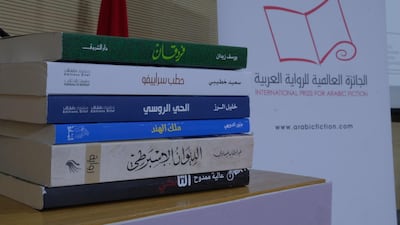This year’s International Prize for Arabic Fiction will be awarded online.
One of the region’s most lucrative literary awards will be announced in a virtual ceremony to be streamed live on Tuesday, April 14 – the same day the event was meant to be held in Abu Dhabi before it was scrapped as health precaution against the coronavirus pandemic.
Beginning at 3pm UAE time, the live feed – which you can access from the award’s YouTube page – will feature speeches and comments by the organising committee and the judging panel before the award is handed out to the winner, who can provide their remarks.
Sponsored by the Department of Culture and Tourism – Abu Dhabi and run with the Booker Prize Foundation, the IPAF is one of the world’s most generous literary prizes.
Each of the six shortlisted authors will collect $10,000 (Dh36,725) and the winner will receive an additional prize of $50,000 and the translation of their book into English.
Nominated authors both new and seasoned
This year’s shortlist throws up a mixed bag of veterans and promising new talent, with writers hailing from Algeria, Egypt, Iraq, Lebanon and Syria.
One author that is no stranger to the awards is former winner Youssef Ziedan. The Egyptian writer – whose work Azazeel picked up the prize in 2009 – is in the running again for his book Fardeqan – The Detention of the Great Sheikh. Set more than a century ago, the novel is an engrossing look at the life of Avicenna, the Muslim polymath whose work made a major impact in the study of philosophy.
He is joined by Algerian author Abdelouahab Aissaoui, who is viewed as an important new voice in the region. His shortlisted novel, The Spartan Court, is a multilayered tale of five characters and their varied experiences of colonialism in 19th century Algiers.
Also on the shortlist is Khalil Alrez, the Syrian novelist and Russian literary specialist (he translated celebrated Russian works by Anton Chekhov and Evgeny Schwartz). He is shortlisted for The Russian Quarter, an allegorical novel about a neighbourhood being dragged into war.
With the Firewood of Sarajevo, Said Khatibi is shortlisted for a novel that follows the lives of fellow Algerian Salim and Bosnian Ivana. Through their complicated relationship, Khatibi tells the tale of two countries rebuilding from the outbreak of war.
The sentimental favourite
If Jabbour Douaihy's name is on the envelope there will be resounding emoji claps. The Lebanese author is the sentimental favourite as he was shortlisted for the IPAF in 2008 (June Rain) and 2012 (The Vagrant), and longlisted in 2015 for The American Quarter.
This time around, he is in the running for his novel The King of India, which recounts a murder case in a Lebanese society enflamed with sectarian tension.
Will we have our second outright female winner?
While the 2020 shortlist failed to match last year's record number of four female nominees (with Lebanese author Hoda Barakat going on to become the first woman to win the prize outright) the lone female author shortlisted is in with a strong shot.
Iraqi writer Alia Mamdouh is up for The Tank, a quietly moving novel that explores how location and memories take on extra resonance when a life is spent mostly in exile.
For more information on the IPAF award visit www.arabicfiction.org


